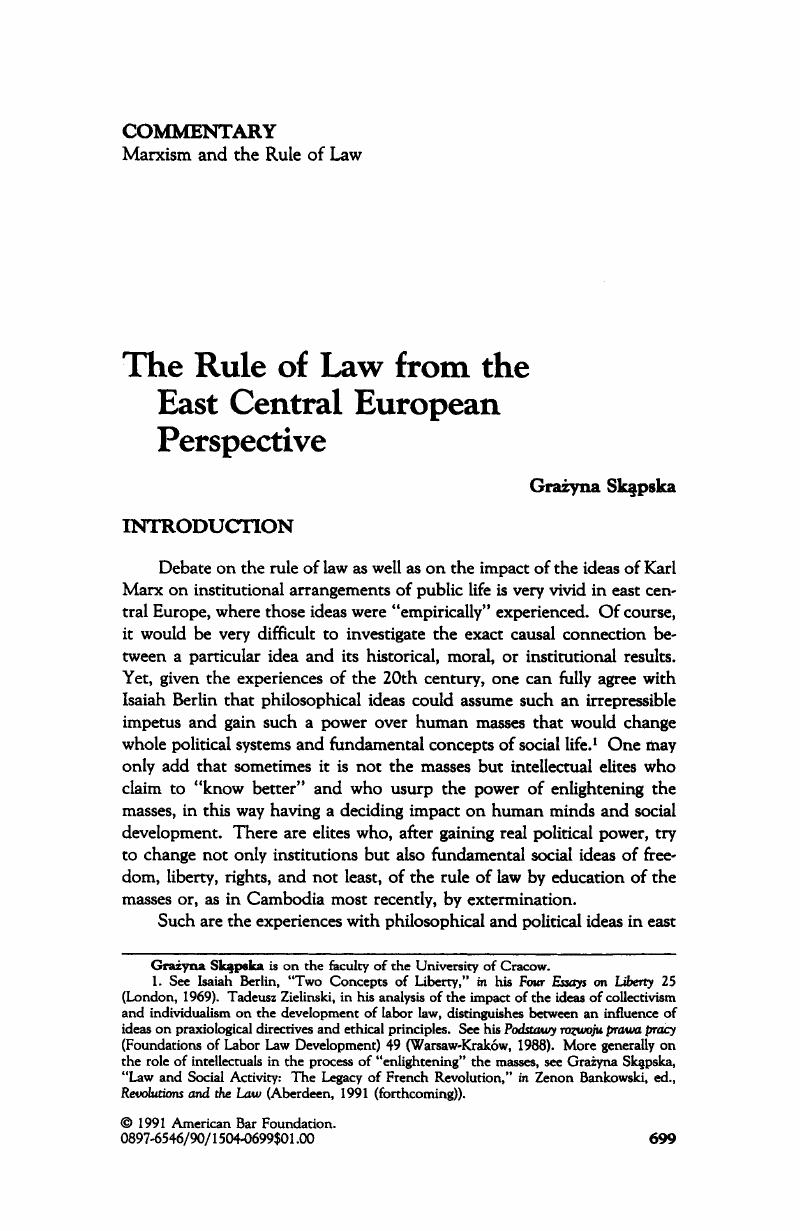Article contents
The Rule of Law from the East Central European Perspective
Published online by Cambridge University Press: 27 December 2018
Abstract

- Type
- Debate: Marxism and the Rule of Law
- Information
- Copyright
- Copyright © American Bar Foundation, 1990
References
1 See Isaiah Berlin, “Two Concepts of Liberty,” in his Four Essays on Liberty 25 (London, 1969). Tadeusz Zielinski, in his analysis of the impact of the ideas of collectivism and individualism on the development of labor law, distinguishes between an influence of ideas on praxiological directives and ethical principles. See his Podstawy rozwoju prawa pracy (Foundations of Labor Law Development) 49 (Warsaw-Kraków, 1988). More generally on the role of intellectuals in the process of “enlightening” the masses, see Grażyna Ska̧pska, “Law and Social Activity: The Legacy of French Revolution,” in Zenon Bankowski, ed., Revolutions and the Law (Aberdeen, 1991 (forthcoming)).Google Scholar
2 Wojciech Salmonowicz, ed., “Porozumienia Okrąglego Stolu” (The Round-Table Agreements) 5 (Olsztyn, 1989).Google Scholar
3 Such was the content of Vaclav Havel's “Word on Words, “ his acceptance speech on the occasion of receiving the 1989 Frankfurt Booksellers' Peace Prize.Google Scholar
4 The question could be raised whether it is at all justified to write about Rechtsstaat in relation to Nazi Germany. Yet a positive answer was given by several German legal scholars writing at the time. See Carl Schmitt, “Der Rechtsstaat,”in H. Frank, Nationalsozialistisches Handbuch für Recht und Gesetzgebung 10 (Munich, 1935), where the Rechtsstaat is defined as “Adolf Hitler's national-socialistic Rechtsstaat” or “strong national-socialistic Rechtsstaat with unquestionable political Führung.” The stress was put on substantive, nationalistic values which should be protected. See Hans Frank, “Einleitung. Grundsátze des nationalsozilaistischen Rechtsdenkens und Rechtswollens,” also in the Frank volume.Google Scholar
5 Allan C. Hutchinson & Patrick J. Monahan, “Law, Politics and the Critical Legal Scholars: The Unfolding Drama of American Legal Thought,” 36 Stan. L. Rev. 210 (1984).CrossRefGoogle Scholar
6 V. I. Lenin, “Speech Regarding Constitutional Assembly,”quoted in Marek Waldenberg, Państwo i rewolucja w mysli politycznej W. I. Lenina (State and Revolution in the Political Thought of W. I. Lenin) 192 (Warsaw, 1978).Google Scholar
7 Duncan Kennedy, “The Structure of Blackstone's Commentaries,” 28 Buffalo L Rev. 205, 211–12 (1979), quoted in Hutchinson & Monahan, 36 Stan. L Rev. 209.Google Scholar
In relation to the problem of modern substantive law and its collectivistic basis versus the project of proceduralization of law as an effort to reconcile the principle of individual autonomy with the collective character of modern life, see Duncan Kennedy, “Comment on Rudolf Wietholter's ‘Materialization and Proceduralization of Modern Law,’” in Christian Joerges SL David M. Trubek, Critical Legal Thought: An American-German Debate 511–24 (Baden-Baden, 1989).Google Scholar
9 Andriej Sinjavskij, Osnowy sovietskoj civilizacii 204 (Paris, 1989).Google Scholar
10 J. A. Lukasheva, Socialistitcheskoje pravosoznanije i zakonnost 22 (Moscow, 1973).Google Scholar
11 George Feifer, “Justice in Moscow,” ch. 1, quoted in Lawrence M. Friedman & Stewart Macaulay, Law and Behavioral Sciences 952–64 (Indianapolis, Ind., 1969).Google Scholar
12 See J. A. Lukasheva, Osnowy sovietskoj civilizacii 25 (Paris, 1989); W. W. Lazariew, Primienienije sovietskowo prawa 156 (Kazań, 1972); M. S. Strogowich, Marksistsko-leninskaja obstschaja tieroja gosudarstwa i prawa. Osnownyje instytuty i ponjatja 513 (Moscow, 1970); Istvan Svabo, “La légalité socialiste dans la République Populaire Hongroise,” in Le concept de la légalité dans le pays socialistes 41 (Warsaw, 1961).Google Scholar
13 Walter Otto Weyrauch, “Gestapo Informants: Facts and Theory of Undercover Operations,” 24 Colum. J. Transnat'l L. L 596 (1986).Google Scholar
14 Jacek Kurczewski, “Rzady prawa” (Rule of Law), Res Publica., No. 3, 1989, at 12.Google Scholar
- 1
- Cited by


